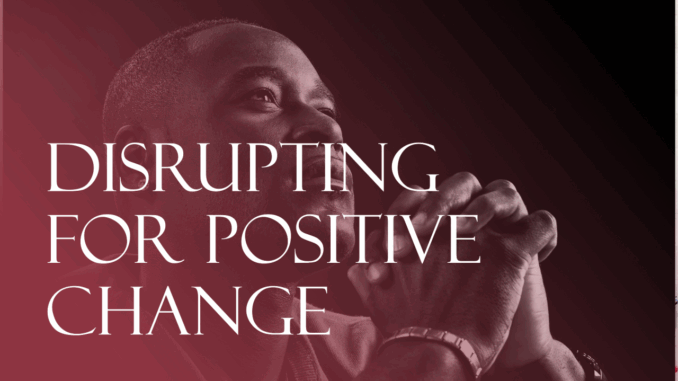
Disruption is often romanticized in business as a bold leap into the unknown, a dramatic reshaping of industries, or a visionary act that changes everything. But behind every disruption is something far less glamorous and far more difficult: courage. The courage to challenge the status quo, to question long-held assumptions, and to risk comfort for the sake of progress. It’s not just about having a big idea—it’s about being willing to act on it, especially when the path forward is uncertain and the resistance is real.
Challenging the status quo begins with noticing what others overlook. It’s the ability to see inefficiencies, outdated norms, or missed opportunities and ask, “Why are we still doing it this way?” That question, simple as it sounds, can be deeply unsettling in environments built on tradition or routine. It requires a mindset that values curiosity over compliance and progress over preservation. A leader who questions a decades-old process may face skepticism, pushback, or even hostility. But without that initial challenge, change never begins. Disruption starts not with answers, but with the willingness to ask better questions.
The courage to disrupt also means accepting discomfort. Change is rarely welcomed with open arms. It threatens established power structures, unsettles routines, and forces people to confront uncertainty. Those who lead disruption must be prepared to navigate resistance—not just from others, but from within. Doubt, fear, and imposter syndrome are common companions on the journey. The difference lies in how they’re managed. Courage doesn’t mean the absence of fear; it means moving forward despite it. A startup founder launching a radically new business model may face criticism from industry veterans, but if they believe in the value they’re creating, that conviction becomes their compass.
Disruption is not about breaking things for the sake of it. It’s about building something better. That requires vision, empathy, and a deep understanding of the problem being solved. Businesses that disrupt successfully do so because they’re solving real pain points. They’re not chasing novelty—they’re pursuing relevance. Consider how ride-sharing platforms challenged the taxi industry. They didn’t just offer a new way to travel—they addressed frustrations around availability, pricing, and convenience. The disruption was meaningful because it improved the experience. That kind of impact doesn’t come from rebellion alone—it comes from insight and intention.
Timing plays a crucial role in disruption. Too early, and the market may not be ready. Too late, and the opportunity may be gone. Navigating this requires not only strategic foresight but also the courage to act when the moment arrives. Many businesses hesitate, waiting for perfect conditions or universal approval. But disruption rarely comes with guarantees. It demands a leap—one informed by data, but driven by belief. A company that sees a shift in consumer behavior and moves quickly to adapt may gain a competitive edge, while others are still debating the risks. Speed, in this context, is not recklessness—it’s responsiveness.
Culture can either fuel or stifle disruption. Organizations that encourage experimentation, tolerate failure, and reward initiative create fertile ground for challenging the status quo. They empower employees to speak up, try new approaches, and rethink old habits. In contrast, cultures that prioritize control, predictability, or hierarchy often resist change. Leaders must be intentional about the environment they cultivate. If disruption is the goal, then psychological safety, open dialogue, and a shared sense of purpose are essential. People need to feel that their ideas matter and that their efforts to innovate will be supported, not punished.
Disruption also requires resilience. The journey is rarely linear. There will be setbacks, missteps, and moments of doubt. What matters is the ability to learn, adapt, and keep going. Businesses that disrupt successfully are those that treat failure as feedback, not as defeat. They iterate, refine, and evolve. This resilience is not just operational—it’s emotional. It’s the ability to stay grounded in purpose, even when the results are slow or the critics are loud. A team that believes in its mission can weather the storms of uncertainty and emerge stronger.
Importantly, disruption must be ethical. Challenging the status quo should not come at the expense of integrity, fairness, or social responsibility. Businesses have a duty to consider the broader impact of their actions—on employees, customers, communities, and the environment. Disruption that exploits rather than elevates is not progress. It’s a shortcut. The most powerful disruptions are those that create value for all stakeholders, not just shareholders. They challenge not only how things are done, but why they’re done—and they offer better answers.
Ultimately, the courage to disrupt is about leadership. It’s about stepping into the unknown with clarity, conviction, and compassion. It’s about seeing what could be and daring to make it real. This kind of leadership doesn’t rely on charisma or bravado—it relies on authenticity, vision, and grit. It’s not easy, and it’s not always celebrated. But it’s essential. Because progress depends on those willing to challenge the status quo, to imagine new possibilities, and to lead the way forward. And in a world that’s constantly changing, that courage is not just valuable—it’s transformative.